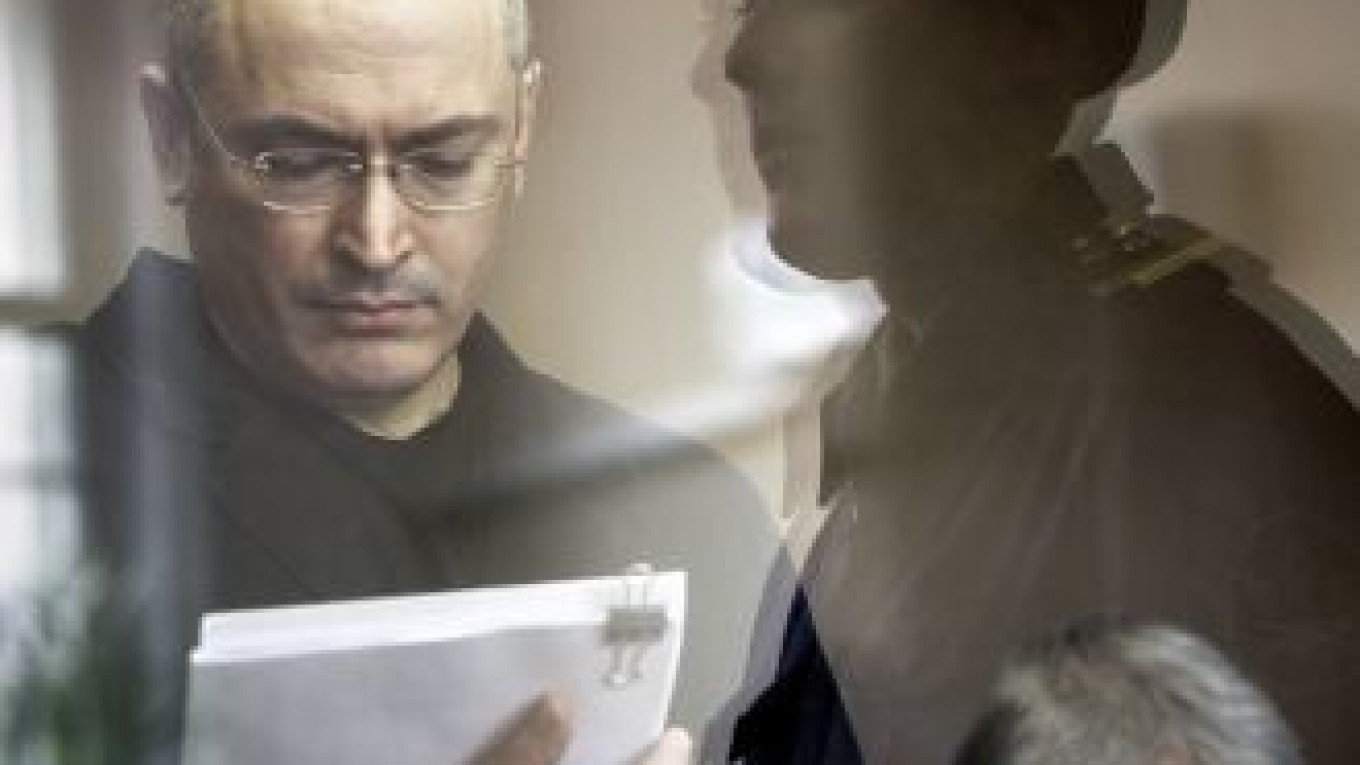Former Yukos chief Mikhail Khodorkovsky, facing another 22 1/2 years in jail on charges that he stole more than $30 billion in oil, took the stand Tuesday for the first time in a year, sparring with prosecutors and playing to the crowd.
The hearing, in Courtroom No. 7 on the third floor of Moscow's Khamovnichesky District Court, was packed with journalists and Khodorkovsky supporters.
At least a dozen people hoping to hear the start of Khodorkovsky's testimony — which his lawyers promised would be lengthy — could not find seats and were forced to watch by closed-circuit television. The judge had previously blocked the video feed on fears that witnesses could hear earlier testimony.
Wearing a black shirt and coat, Khodorkovsky was led into the glass-and-steel defendants cage along with his former partner, Platon Lebedev, who was dressed in an Adidas track suit. They were accompanied by rifle-wielding guards who, despite the warm weather, were wearing large fur hats.
Khodorkovsky seemed to be in good spirits and flashed smiles at the crowd.
Once the pushing for seats on the courtroom's narrow benches had subsided, the public began to notice a hint of petroleum in the air. A few moments later, the odor's source became clear.
It was oil, the main subject of the long-lasting trial, and it was coming from the defendants' cage.
"I ask the court to observe this oil and well fluid," Khodorkovsky said.
To the surprise of the judge and prosecutors, he produced two large jars, one containing crude oil and one containing well fluid — the mix of water, oil, drilling fluid and other substances that first comes out of the ground. Khodorkovsky, a chemistry graduate, began to explain that the substances are clearly different, and even visibly so.
In the first motion of his defense testimony, Khodorkovsky defined the word “oil” in Russian and asked for permission to conduct “an investigative experiment.”
The judge, Viktor Danilkin, was not amused and yelled that the fluids were not permitted in the courtroom, which he noted was packed and had only one door.
“Guard, get rid of that flammable liquid!” Danilkin yelled.
Court marshals removed the jars, providing him water instead. As they were leaving, Khodorkovsky noted that he was not giving his oil to the court.
"In this trial, the prosecution replaces the notion of 'oil' and the 'right to possess,'" Khodorkovsky said, adding that he would like to show the difference to the court.
He went on to explain that Yukos had been buying the right to purchase oil from its subsidiaries, not the actual crude. "The oil … didn't disappear anywhere," he said.
"I'd like to offer that [prosecutor Valery] Lakhtin try dispose of this oil, represented by water in the case,” Khodorkovsky said.
Flustered, Lakhtin proceeded to flip through the Criminal Procedural Code before finding a passage saying that experiments in court were not allowed, drawing bursts of laughter from the audience.
Khodorkovsky and Lebedev, both sentenced in 2005 to eight years in prison for fraud and tax evasion, are now being tried on charges of embezzling more than $25 billion of the oil that they were convicted of not paying taxes on.
The case, like its predecessor, is widely seen by Khodorkovsky's supporters as politically motivated.
On Tuesday, Khodorkovsky said the whole trial was based on a “fabricated case,” for which no documentary evidence had been provided. He asked prosecutors to explain their charges, which he said were “absolutely contradictory.” Otherwise, he said, he would not know how to formulate his defense.
“Are you going to explain the charges?” the judge asked the prosecutors. “No,” Lakhtin answered sharply, adding that they were written clearly in the case materials.
When Khodorkovsky continued, he argued that the theft allegations were illogical since it would be impossible to steal 350 million metric tons of oil, which is more than Yukos produced during the entire period in question.
He also ridiculed the idea that prosecutors were charging him for stealing from a company that he controlled, noting that Yukos regularly paid dividends to shareholders.
Lebedev also took the stand Tuesday, angering both Lakhtin and Danilkin by repeatedly calling the charges and case "rotten."
Among those in attendance supporting the defendants were numerous elderly people, some wearing T-shirts reading “Khodorkovsky Go Home.” His parents, Boris and Marina, looked tired and had to be squeezed alongside journalists for the roughly six hours of hearings, which were regularly interrupted for recesses. ?
Along with the second Yukos case in Moscow, last month the Strasbourg Court of Human Rights began hearing a $98 billion lawsuit filed by former Yukos management against Russia for the oil company's 2006 bankruptcy and subsequent sale to state-run Rosneft.
The Moscow trial is to resume Wednesday morning, when Khodorkovsky will continue his speech.
A Message from The Moscow Times:
Dear readers,
We are facing unprecedented challenges. Russia's Prosecutor General's Office has designated The Moscow Times as an "undesirable" organization, criminalizing our work and putting our staff at risk of prosecution. This follows our earlier unjust labeling as a "foreign agent."
These actions are direct attempts to silence independent journalism in Russia. The authorities claim our work "discredits the decisions of the Russian leadership." We see things differently: we strive to provide accurate, unbiased reporting on Russia.
We, the journalists of The Moscow Times, refuse to be silenced. But to continue our work, we need your help.
Your support, no matter how small, makes a world of difference. If you can, please support us monthly starting from just $2. It's quick to set up, and every contribution makes a significant impact.
By supporting The Moscow Times, you're defending open, independent journalism in the face of repression. Thank you for standing with us.
Remind me later.


